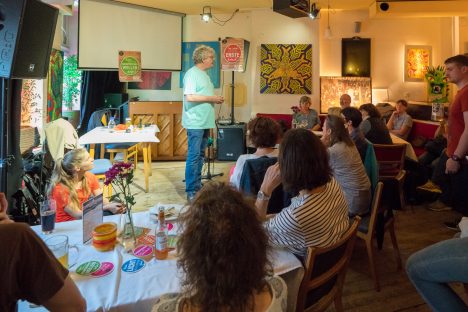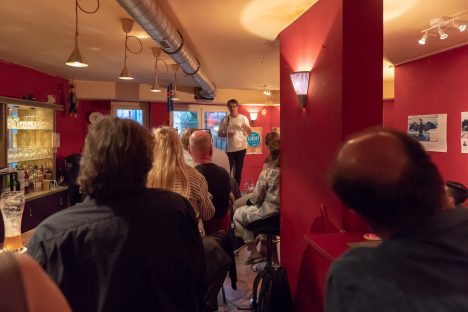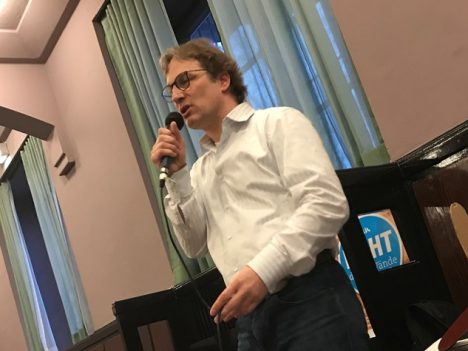For the fourth time already researchers spread out all over Hamburg’s bars to talk about their exiting work. From Othmarschen to Bergedorf people had the opportunitiy at the latest edition from „Wissen vom Fass“ (Science on Tap) to quench their thirst for knowledge.
The idea that initiator Prof. Jan Louis brought to Hamburg four years ago, derives from the Weizmann Institute in Tel Aviv and is today a firmly established yearly “scientific pub programme”. Hamburg’s audience obtained a variety of topics with talks from STEM, the humanities and social sciences through to legal sciences. 45 talks with top class scientists that spared no effort to explain their highly complex science – sometimes in small groups with 6 people, sometimes with 100 guests; sometimes as an equisite discussion round, in other cases as a scientific happening. “It was a wonderful event”, was one of many exuberant comments.

„Do nanoparticels cure?“ Prof. Horst Weller (Universität Hamburg) asked the audience in the bar Brückenstern in Hamburg’s Schanzen district. „What do we need them for and will they maybe help to defeat diseases?” he asked and encouraged a lively discussion. Credit: CUI, Andreas Vallbracht

„We do the ‚bar work‘ within science. You can come to us with your ideas concerning research questions and maybe we can realize an exciting project together,” Prof. Christian Bressler from the European XFEL explained in Tatort Bar in Altona with a twinkle in his eye. Credit: CUI, Thomas Vallbracht

Normally students have their lunch in the HFBK-canteen in Uhlenhorst district, that offered a rustic ambience to Prof. Nils Huse and his guests. He gave a lively and exciting talk about his research on the “uniqueness of water“. Credit: UHH, Johannes Möller

„How do you shrink an accelerator?“ Prof. Franz Kärtner (Universität Hamburg, DESY) asked his audience in the Chiling Q Bar in Eimsbüttel district. Credit: CUI, Andreas Vallbracht
“Wissen vom Fass” (Science on Tap) is jointly organized by DESY, CUI, the collaborative research center Particles, Strings and the Early Universe (SFB 676), the Department of Physics at Universität Hamburg, and PIER, the strategic partnership between DESY and Universität Hamburg.

